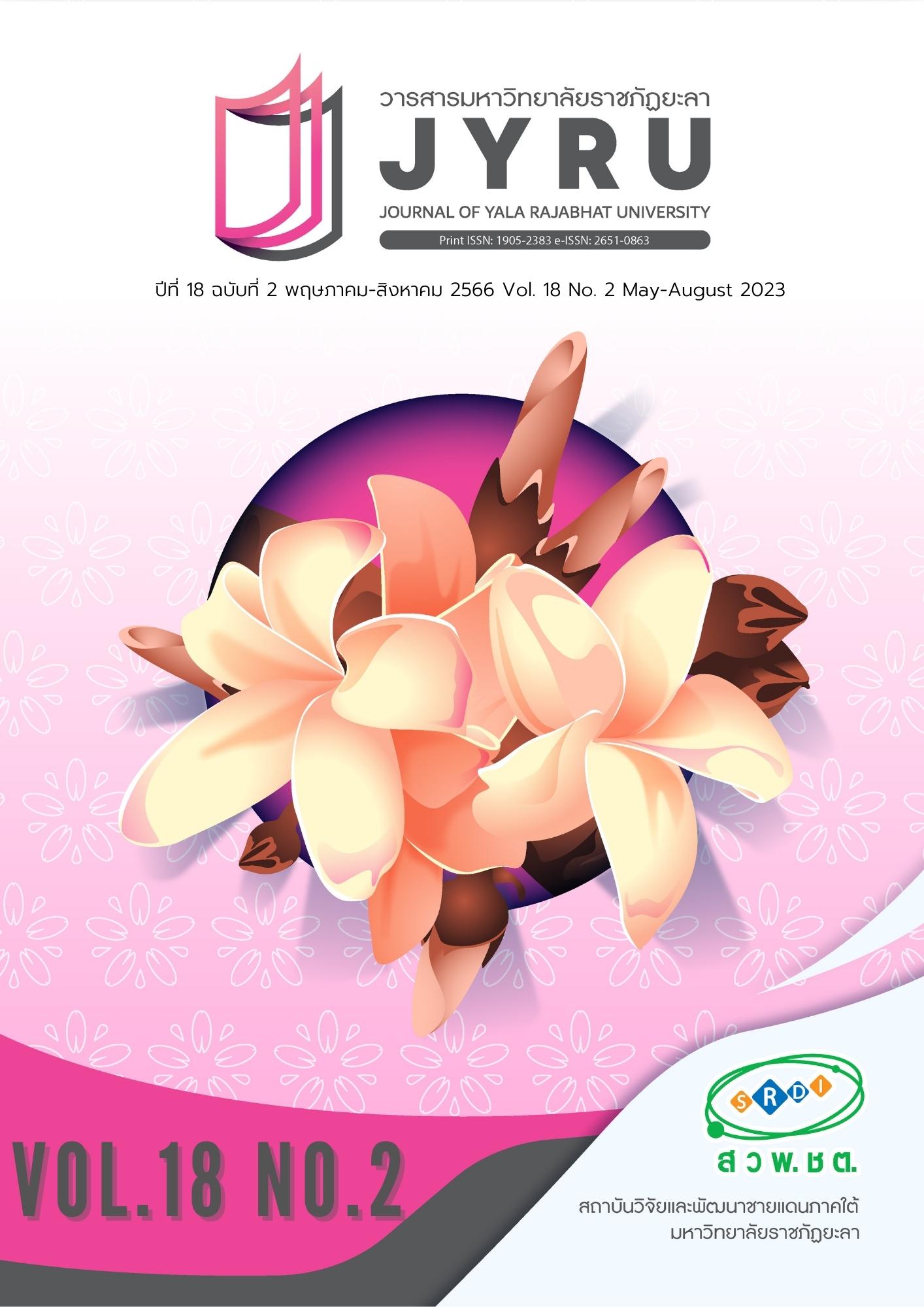แนวทางการส่งเสริมทางสมรรถนะการแก้ปัญหาแบบร่วมมือ โดยการจัดการเรียนรู้ตามแนวทางสะเต็มศึกษา เรื่อง ธรณีพิบัติภัยของนักเรียนชั้นมัธยมศึกษาปีที่ 6 ในช่วงการแพร่ระบาดของโควิด-19
Main Article Content
บทคัดย่อ
งานวิจัยเชิงปฏิบัติการนี้ มุ่งศึกษาผลการส่งเสริมสมรรถนะการแก้ปัญหาแบบร่วมมือ และแนวทางการจัดการเรียนรู้ตามแนวทางสะเต็มศึกษาที่ส่งเสริมสมรรถนะการแก้ปัญหาแบบร่วมมือ ของนักเรียนชั้นมัธยมศึกษาปีที่ 6 เรื่องธรณีภัยพิบัติ ในช่วงการแพร่ระบาดของโควิด-19 ผู้ให้ข้อมูลสำคัญ คือ นักเรียนชั้นมัธยมศึกษาปีที่ 6/1 โรงเรียนเนินมะปรางศึกษาวิทยา จังหวัดพิษณุโลก ภาคเรียนที่ 2 ปีการศึกษา 2564 จำนวน 35 คน ผู้วิจัยดำเนินการสอนโดยใช้แผนการจัดการเรียนรู้ จากนั้นเก็บข้อมูลโดยใช้แบบสะท้อนผลการจัดการเรียนรู้ แบบสังเกต แบบประเมินสมรรถนะการแก้ปัญหาแบบร่วมมือ และแบบประเมินชิ้นงาน การวิจัยเป็นวิจัยปฏิบัติการประกอบด้วย วงจร PAOR ต่อเนื่องกัน 3 วงจร วิเคราะห์ข้อมูลด้วยวิธีวิเคราะห์เนื้อหา ร้อยละ และค่าเฉลี่ย ดำเนินการตรวจสอบข้อมูลแบบสามเส้า ผลการวิจัยพบว่า แนวทางการจัดการเรียนรู้สะเต็มศึกษาในช่วงโควิด-19 ประกอบด้วย 5 ขั้น ได้แก่ 1) การระบุปัญหา 2) การรวบรวมข้อมูลและแนวคิดที่เกี่ยวข้อง 3) ออกแบบ วางแผนและพัฒนา 4) การทดสอบและประเมินผล 5) การนำเสนอผลลัพธ์ โดยเน้นกระบวนการทำงานร่วมกันของนักเรียนต้องอาศัยเทคโนโลยีเข้ามาเติมเต็มเพื่อให้การทำงานดำเนินต่อเนื่องได้ ทั้งนี้ยังพบว่า นักเรียนมีสมรรถนะการแก้ปัญหาแบบร่วมมือทั้ง 3 ด้านเพิ่มขึ้น โดยสมรรถนะการสร้างและเก็บรักษาความเข้าใจที่มีร่วมกันได้รับการพัฒนามากที่สุด รองลงมา ได้แก่ การสร้างและรักษาระเบียบของกลุ่ม และการเลือกวิธีการดำเนินการที่เหมาะสมในการแก้ปัญหา ตามลำดับ
Article Details

อนุญาตภายใต้เงื่อนไข Creative Commons Attribution-NonCommercial-NoDerivatives 4.0 International License.
บทความ ข้อมูล เนื้อหา รูปภาพ ฯลฯ ที่ได้รับการเผยแพร่ในวารสารมหาวิทยาลัยราชภัฏยะลานี้ ถือเป็นลิขสิทธิ์ของวารสารมหาวิทยาลัยราชภัฏยะลา หากบุคคลหรือหน่วยงานใดต้องการนำทั้งหมดหรือส่วนหนึ่งส่วนใดไปเผยแพร่ต่อหรือกระทำการใดๆ จะต้องได้รับอนุญาตเป็นลายลักษณ์อักษรจากวารสารมหาวิทยาลัยราชภัฏยะลาก่อนเท่านั้น
เอกสารอ้างอิง
Boonjong, C. (2017). A study of teachers' opinions on media use technology in teaching and learning management of schools in the Abul Ratchathani diocese [Online]. Retrieved July 16, 2022, from: http://www.edu-journal.ru.ac.th/AbstractPdf/2560-2-13_1512543281_surin_003.pdf (in Thai)
Chalermchai, W., Sucaromana, U., Pahuyut, P. & Suriyadsin, S. (2020). The effects of group dynamics activities on the enhancement of the teamwork of student council committee members. Rajapark journal, 14(37), 188-203. (in Thai)
Charoensuk, S. (2019). Development of collaborative problem solving competency of 11 grade students using STEM learning through engineering design process in geological phenomena. Self-study, Master's degree. Naresuan university. (in Thai)
Choomchua, H. & Chanunan, S. (2020). Eahancing 11th grade student' collaborative problem solving competency by using collaborative problem-based learning approach (CPBL) with the use of padlet application on the topic of electrochemistry. Journal of education Naresuan University, 23(3), 358-370. (in Thai)
Faikumta, C. (2016). Classroom action research in science classroom. Bangkok: Institute of academic development (IAD). (in Thai)
Partnership for 21 " Century Skills. (2011). Framework for 21" century learning [Online]. Retrieved September 10, 2021, from: http://www.p21.org/storage/documents/docs/P21_framework_ definitions_new_logo_2015.pdf (in Thai)
Kemmis, & McTaggart, R. (1988). The action research planner (3rd ed.) Geelong: Deakin University, Australia.
Kijkuakul, S. (2019). 378513 Scientific research studies (1st printing). Phitsanulok: Faculty of education Naresuan University. (in Thai)
National PISA operation center Institute for the promotion of teaching science and technology. (2020). PISA 2015 result collaborative problem solving competency. Bangkok: The Institute for the promotion of teaching science and technology. (in Thai)
Orapiriyakul, S. (2019). STEAM EDUCATION: Innovative education Integrated into learning management. Journal of Curriculum research and development, 9(1), 1-16. (in Thai)
Organisation for economic co-operation and development, OECD. (2013). PISA 2012 assessment and analytical framework: Mathematics, reading, science, problem solving and financial literacy, OECD publishing.
Organisation for economic co-operation and development, OECD. (2017). PISA 2015 assessment and analytical framework: Science, reading, mathematic, financial literacy and collaborative problem solving, revised edition, PISA. Paris: OECD publishing.
Siriphan, S., Wongsuwan W., & Namuang A. (2014). Teaching method approach with graphical techniques and contemporary Information to improve student achievement. Princess of Naradhiwas University Journal of Humanities and Social Sciences, 1(1), 12-20. (in Thai)
Sukon, S. (2019). Enhancing the collaborative problem solving competency of 12th grade students based on STEM education through problem based learning in the topic of polymer. Self-study, Master's degree. Naresuan university. (in Thai)
The Institute for the promotion of teaching science. (2014). STEM education camp affiliate guide. (1st printing). Bangkok: The Institute for the promotion of teaching Science and Technology Ministry of Education. (in Thai)
Vasquez, J.A., Sneider, C., & Comer, M. (2013). STEM lesson essentials: Integrating science, technology, engineering, and mathematics. Portsmouth, Portsmouth, NH: Heinemann.


